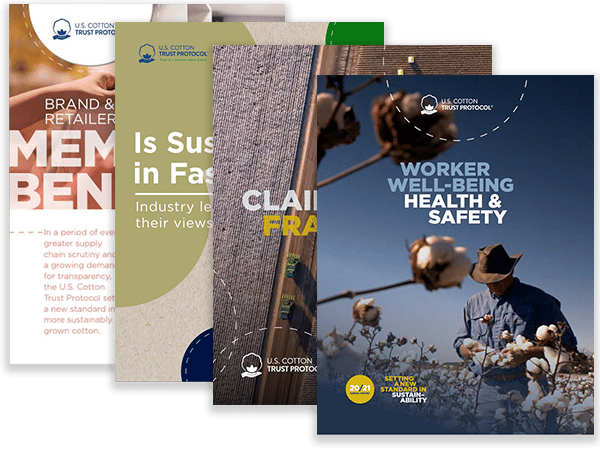Respecting People and Planet
Areas of focus include fair labor and child labor as well as safety and hygiene. If any individual registers for the Trust Protocol but does not adhere to the worker well-being principles, they are denied membership.
While labor and safety practices in the U.S. cotton industry are regulated by multiple federal and state agencies, the Trust Protocol ensures compliance through third-party verification processes, confirming that all standards are met.
Trust Protocol Worker Well-Being Criteria
A key principle of the Trust Protocol is safe labor and worker well-being. In order to become a grower member, individuals must adhere to 12 criteria to ensure that relevant U.S. regulations are upheld.
- Workers are treated fairly
- Wages equal to or higher than required by law are provided
- Working hours comply with national and state law
- Children are not exploited in any form
- There is no forced, compulsory, bonded or trafficked labor
- Workplace is kept safe by minimizing hazards
- Discrimination of all forms is forbidden
- Equal wages are paid to workers who perform the same job, regardless of gender, race, or ethnicity
- Safe and hygienic sanitation is accessible
- Potable drinking water and wash-water are provided
- Workers have freedom of associations
- Abuse or harassment of any kind is not tolerated
Safe Labor Practices
There is no forced labor in U.S. cotton production. This includes incarcerated persons and child labor.
The U.S. Department of Labor also enforces the Fair Labor Standards Act which restricts the employment and abuse of child workers. Provisions under the act are designed to protect children’s access to education and prohibit them from jobs that are detrimental to their health and safety. Child Protective Services (CPS) is the governmental agency in many states of the United States that responds to reports of child abuse or neglect. The Child Abuse Prevention and Treatment Act provides federal funding to States in support of prevention, assessment, investigation, prosecution, and treatment activities and also provides grants to public agencies and nonprofit organizations for demonstration programs and projects.
In order to become a grower member, individuals must comply with all of these laws.
Crop Protection
The Trust Protocol’s farm management and worker well-being principles overlap to provide full coverage of safe labor practices which include a focus on safe crop protection practices. EPA regulations mandate that farmers provide training and inform workers about pesticide safety, provide protections from potential exposure, and have plans to mitigate exposure all in ensuring the safety of employees. The EPA also ensures that workers have training on procedures to safely handle, store and apply pesticides.
Cotton is a difficult crop to grow. It is estimated that without pesticides, over 80% of the global cotton crop could be lost to insects, weeds, and fungi (Oerke, E.-C., & Dehne, H.-W. (2004). Safeguarding production— losses in major crops and the role of crop protection. Crop Protection, 23(4), 275–285. https://doi.org/10.1016/j.cropro.2003.10.001). This is why U.S. cotton growers make targeted use of a diverse and integrated range of pest management measures to avoid pest damage. When growers determine that pesticide use is unavoidable, they follow the United States’ stringent legal requirements for pesticide use. In addition, the U.S. Cotton Trust Protocol systematically measures impact across relevant key metrics such as soil carbon, land use efficiency, and soil loss.


